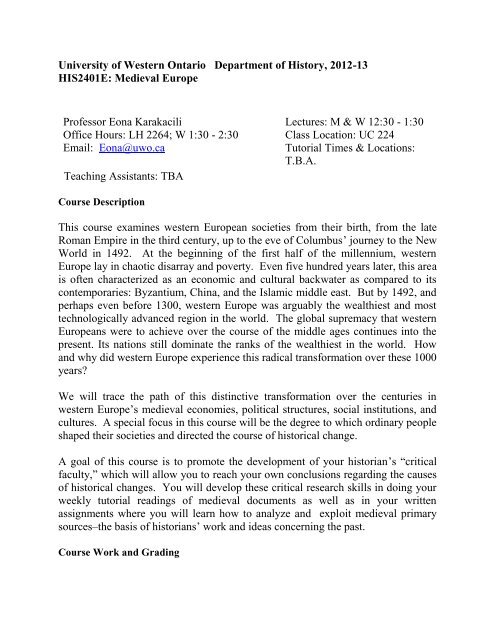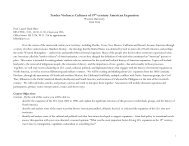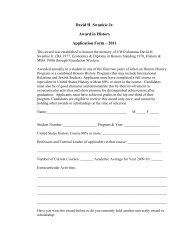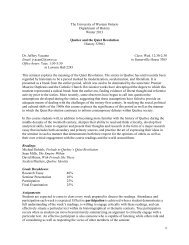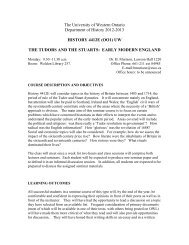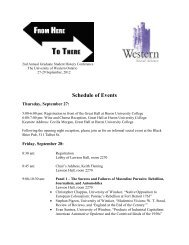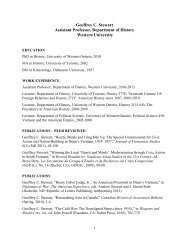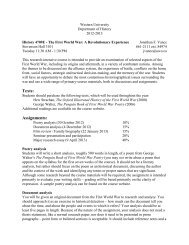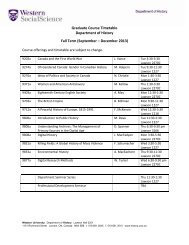Syllabus - History - University of Western Ontario
Syllabus - History - University of Western Ontario
Syllabus - History - University of Western Ontario
You also want an ePaper? Increase the reach of your titles
YUMPU automatically turns print PDFs into web optimized ePapers that Google loves.
<strong>University</strong> <strong>of</strong> <strong>Western</strong> <strong>Ontario</strong> Department <strong>of</strong> <strong>History</strong>, 2012-13<br />
HIS2401E: Medieval Europe<br />
Pr<strong>of</strong>essor Eona Karakacili<br />
Office Hours: LH 2264; W 1:30 - 2:30<br />
Email: Eona@uwo.ca<br />
Teaching Assistants: TBA<br />
Lectures: M & W 12:30 - 1:30<br />
Class Location: UC 224<br />
Tutorial Times & Locations:<br />
T.B.A.<br />
Course Description<br />
This course examines western European societies from their birth, from the late<br />
Roman Empire in the third century, up to the eve <strong>of</strong> Columbus’ journey to the New<br />
World in 1492. At the beginning <strong>of</strong> the first half <strong>of</strong> the millennium, western<br />
Europe lay in chaotic disarray and poverty. Even five hundred years later, this area<br />
is <strong>of</strong>ten characterized as an economic and cultural backwater as compared to its<br />
contemporaries: Byzantium, China, and the Islamic middle east. But by 1492, and<br />
perhaps even before 1300, western Europe was arguably the wealthiest and most<br />
technologically advanced region in the world. The global supremacy that western<br />
Europeans were to achieve over the course <strong>of</strong> the middle ages continues into the<br />
present. Its nations still dominate the ranks <strong>of</strong> the wealthiest in the world. How<br />
and why did western Europe experience this radical transformation over these 1000<br />
years?<br />
We will trace the path <strong>of</strong> this distinctive transformation over the centuries in<br />
western Europe’s medieval economies, political structures, social institutions, and<br />
cultures. A special focus in this course will be the degree to which ordinary people<br />
shaped their societies and directed the course <strong>of</strong> historical change.<br />
A goal <strong>of</strong> this course is to promote the development <strong>of</strong> your historian’s “critical<br />
faculty,” which will allow you to reach your own conclusions regarding the causes<br />
<strong>of</strong> historical changes. You will develop these critical research skills in doing your<br />
weekly tutorial readings <strong>of</strong> medieval documents as well as in your written<br />
assignments where you will learn how to analyze and exploit medieval primary<br />
sources–the basis <strong>of</strong> historians’ work and ideas concerning the past.<br />
Course Work and Grading
Due Date Course Work % <strong>of</strong><br />
Final<br />
Grade<br />
week <strong>of</strong> October 15,<br />
due in your tutorial &<br />
Turnitin.com<br />
week <strong>of</strong> January 7, due<br />
in your tutorial &<br />
Turnitin.com<br />
week <strong>of</strong> March 18, due<br />
in your tutorial &<br />
Turnitin.com<br />
Book Analysis (4 to 6 pages) 15 %<br />
Document Study (8 to 10<br />
pages)<br />
Document Study (8 to 10<br />
pages)<br />
Tutorial Participation (5%<br />
each term)<br />
20 %<br />
25 %<br />
10 %<br />
T.B.A. Final Exam 30 %
Description <strong>of</strong> Graded Course Work<br />
1. In the Book Analysis assignment, you will closely analyze and critique a<br />
historian’s hypothesis, focusing on the primary source evidence which the<br />
researcher employs to support her or his arguments. A sample list <strong>of</strong> books is<br />
supplied in this syllabus. You are also welcome to select any other book on a<br />
medieval topic in which you are interested. Be sure to select one that will allow<br />
you to fulfill the assignment’s requirements easily (see the handout). You should<br />
look for a book with a clear hypothesis–not something giving a general overview<br />
<strong>of</strong> a subject or question. Don’t panic! A detailed handout will be given to you<br />
(online on our OWL class site) that clearly outlines the assignment’s requirements<br />
and explains exactly how to write it.<br />
2. In each Document Study paper, you will put together your own hypothesis<br />
regarding some aspect <strong>of</strong> medieval society, using a primary source from this<br />
period. A list <strong>of</strong> sources for each assignment is provided at the end <strong>of</strong> the syllabus.<br />
You may employ an alternative medieval source on some aspect <strong>of</strong> medieval<br />
society that interests you, with your teaching assistant’s approval. And once again,<br />
you will receive a detailed handout that outlines the assignment’s requirements<br />
and helps you to succeed (online on our OWL class site).<br />
All assignments are due in paper copy in your tutorial. Extensions to a due date<br />
are usually available only on medical or compassionate grounds (see the<br />
information at the end <strong>of</strong> the syllabus on the procedure to obtain academic<br />
accommodation from the Academic Counselling Office). Otherwise, marks will be<br />
deducted for handing in an assignment after a due date. The late penalty is five<br />
percentage points from the final grade <strong>of</strong> the assignment for each day, including<br />
weekends, that the paper is late. Try to get those assignments in on time. I know<br />
that the amount <strong>of</strong> work that you have to do for all your courses can be<br />
overwhelming at times but the further behind you fall in your course work, the<br />
harder it will be to catch up.<br />
You must also submit an identical electronic copy <strong>of</strong> each assignment, before or on<br />
the due date, to http:/turnitin.com, where you will register with your own password<br />
to ensure that your work is secure. The local website, http://turnitin.uwo.ca will<br />
supply you with registration information. I will announce the course password and<br />
identification number in class before the due date <strong>of</strong> the first assignment. Please<br />
note that the late marks will also apply to an assignment submitted in paper but not<br />
to Turnitin.com.
3. The weekly tutorial readings are your only required readings for the course.<br />
These generally consist <strong>of</strong> medieval primary sources, up to 40 pages a week.<br />
Reading and analyzing these are the exercises through which you will acquire the<br />
skills <strong>of</strong> historical research. Doing these readings will also help you to succeed in<br />
your assignments as well as the final exam. The historian’s critical faculty is<br />
further cultivated by talking, debating, and interacting with your fellow students in<br />
your tutorial. It’s been said that, to a certain extent, each historian creates her or<br />
his history. As unique individuals, each one <strong>of</strong> us has different insights that we can<br />
share with one another in the tutorials.<br />
Your teaching assistant will indicate the marking rubric for the tutorial<br />
participation grade.<br />
4. The final exam will cover all the material in the lectures. Not to worry–it is<br />
thematic in nature (no need to remember anything but the most important details)<br />
and the lectures will underscore these themes and their relationship to each weekly<br />
topic (or topics).<br />
Succeeding in the Course: Lectures<br />
Attendance at lectures is critical. There is no required textbook for the course.<br />
One is suggested below for those who would like more background information for<br />
some lectures but you will not be tested on any <strong>of</strong> its material. This textbook<br />
serves only as a supplement to the lectures and does not summarize them.<br />
The lectures will also help you to develop your historical “critical faculty” by the<br />
occasional discussion <strong>of</strong> how our ideas about the past emerged or changed, as the<br />
result <strong>of</strong> researchers’ employment <strong>of</strong> particular sources and methodologies. In<br />
addition, they will supply the context for your tutorial readings <strong>of</strong> primary sources.<br />
I know that some <strong>of</strong> you might be worried that you cannot write quickly enough<br />
during the lectures and might miss jotting down some material. Stay calm! For<br />
each lecture, my Powerpoint presentations, will be placed on our Owl class site<br />
(formerly WebCT), before each lecture, and you are free to download them. These<br />
can serve as a guide for your note taking and study aid for the final exam.<br />
Weekly Required Readings For Tutorials
You will receive a selection <strong>of</strong> medieval historical documents to read almost every<br />
week. A variety <strong>of</strong> source types have been selected to give you a broad range <strong>of</strong><br />
experience with different historical documents and their methods. The readings<br />
are usually around twenty to forty pages and may be downloaded from our online<br />
OWL class site. These primary source readings will usually be on a topic<br />
examined one week prior in the lecture to allow you to study the primary sources<br />
within the context <strong>of</strong> information given in class.<br />
This medieval material can be difficult to work with, especially when you are new<br />
to historical research, and so you should be sure to give yourself at least several<br />
hours or more to engage in their analysis. Be patient with yourself. At first, you<br />
may find reading these difficult but as time goes on, it will become easier.<br />
Students <strong>of</strong>ten tell me that the assigned readings in second term are less<br />
complicated than those in the first but in reality the level <strong>of</strong> difficulty is the same:<br />
it is just that students have become much better in interpreting historical<br />
documents.<br />
When examining any historical source, you need to take into consideration who<br />
wrote it, when, where, what kind <strong>of</strong> document this may be (e.g. law code), and why<br />
it was produced. These elements will help shape the type and quality <strong>of</strong><br />
information which it supplies to you. Influences that you need to think about<br />
include the potential influence <strong>of</strong> genre and authorship (e.g. her or his<br />
status/sex/religion/political affiliation), as well as the purpose <strong>of</strong> the author in<br />
producing this work (e.g. intended audience, historical circumstances under which<br />
the document was produced). You should also be aware <strong>of</strong> any problems that<br />
might undermine the text’s legitimacy as a source (e.g. fragmentation, authenticity,<br />
tampering). Finally, it can be useful to think about what is left “unsaid” in the<br />
document and the significance <strong>of</strong> any silence on this point. These considerations<br />
will also help you to gauge its representativeness.<br />
Historians will generally read primary sources with a particular question in mind.<br />
Most sources, though, can be employed to address a multitude <strong>of</strong> issues. For<br />
instance, researchers have used political treatises to provide insights on<br />
contemporary views <strong>of</strong> women and saints’ lives for their information on medieval<br />
daily life. So read with an “open” mind and enjoy your excursions into medieval<br />
societies!<br />
No Required Textbook
For those who would like a reference tool for some dates and events, Warren<br />
Hollister and Judith Bennett’s, A Short <strong>History</strong> <strong>of</strong> Medieval Europe 10 th Edition is<br />
suggested. It is on reserve at Weldon Library. Used copies are also on sale on the<br />
internet, usually for a relatively low price. I have included the pertinent readings<br />
from this textbook under each lecture.<br />
Lecture Topics & Readings<br />
__________________________________________________________________<br />
____________<br />
September 10, 12: Introduction to the Course & The Late Roman Empire:<br />
The Foundation<br />
No Tutorials<br />
Suggested Textbook Readings: 1-14.<br />
__________________________________________________________________<br />
____________<br />
September 17, 19: Early Christianity & Empire<br />
Tutorials Begin: Read the Book Analysis Handout and the chapter from<br />
Rudolph Bell’s Holy Anorexia (online on our OWL class site)–preparation for<br />
first assignment<br />
Suggested Textbook Readings: 14-29.<br />
__________________________________________________________________<br />
____________<br />
September 24, 26: Popular Christianity & Orthodoxy<br />
Tutorial: Same material as previous week–preparation for first assignment<br />
Suggested Textbook: 61-63.<br />
__________________________________________________________________<br />
____________<br />
September 30, October 1: Rise <strong>of</strong> the Barbarian Kingdoms in the West<br />
Tutorial: Sources, Week 1 (online) Also read and discuss Document Study<br />
Assignment Handout in reference to weekly primary source reading.<br />
Suggested Textbook Readings: 30-48.<br />
__________________________________________________________________<br />
____________<br />
October 8, 10: Early Church and State Relations<br />
No Tutorials (Thanksgiving Day Monday)
Suggested Textbook Readings: none.<br />
__________________________________________________________________<br />
____________<br />
October 15, 17: Monasticism and Society<br />
Tutorial: Sources, Week 2 (online) Book Analysis is due this week in your<br />
tutorial and on Turnitin.com.<br />
Suggested Textbook Readings: 56-67.<br />
__________________________________________________________________<br />
___________<br />
October 22, 24: New Empires: Islam and the Carolingians to the Ninth<br />
Century<br />
Tutorial: Sources, Week 3 (online)<br />
Suggested Textbook Readings: 81-95; 97-118.<br />
__________________________________________________________________<br />
____________<br />
October 29, 31: Changes and Continuities in the Ninth & Tenth Centuries<br />
(includes serfdom and the manor)<br />
Tutorial: Sources, Week 4 (online)<br />
Suggested Textbook Readings: 119-147; 159-163.<br />
__________________________________________________________________<br />
____________<br />
November 5, 7: The Economic Take-<strong>of</strong>f & The Role <strong>of</strong> Guilds<br />
Tutorial: Sources, Week 5 (online)<br />
Suggested Textbook Readings: 167-173.<br />
__________________________________________________________________<br />
____________<br />
November 12, 14: Guilds, con’d; The Instruments <strong>of</strong> Growth: the Evolution <strong>of</strong><br />
Financial Instruments<br />
Tutorial: Sources, Week 6 (online)<br />
Readings, Week 10: Text, 242-266; 268-291<br />
__________________________________________________________________<br />
____________
November 19, 21: Everyday Life in the Medieval Countryside<br />
Tutorial: Sources, Week 7 (online)<br />
Suggested Textbook Readings: 174-179.<br />
__________________________________________________________________<br />
____________<br />
November 26, 28: Creation <strong>of</strong> the <strong>University</strong>; Magic and Science<br />
Tutorial: Sources, Week 8 (online)<br />
Suggested Textbook Readings: 307-19.<br />
__________________________________________________________________<br />
____________December 3, 5: Centralization <strong>of</strong> Governments & the Influence<br />
<strong>of</strong> Ordinary People, 11 th to 13 th Centuries<br />
Tutorial: Sources, Week 9 (online)<br />
Suggested Textbook Readings: 266-288.<br />
__________________________________________________________________<br />
____________<br />
WINTER HOLIDAYS & GOOD LUCK WITH YOUR EXAMS!<br />
__________________________________________________________________<br />
____________<br />
January 7, 9: Emergence <strong>of</strong> the Secular State?: Conflict Between Church &<br />
State, 11 th to early 14 th Centuries<br />
Tutorial: No readings! First Document Study Assignment is due in your tutorial<br />
and on Turnitin.com.<br />
Suggested Textbook Readings: 240-265.<br />
__________________________________________________________________<br />
____________<br />
January 14, 16: Heresy, Orthodoxy & Society<br />
Tutorial: Week 10 (online)<br />
Suggested Textbook Readings: 186-213; 235-236.<br />
__________________________________________________________________<br />
____________<br />
January 21, 23: Byzantium and the First Crusade
Tutorial: Sources, Week 11 (online)<br />
Suggested Textbook Readings: 225-228.<br />
__________________________________________________________________<br />
__________<br />
January 28, 30: Crusades and Consequences<br />
Tutorial: Sources, Week 12 (online).<br />
Suggested Textbook Readings: 228-235; 236-238.<br />
__________________________________________________________________<br />
____________<br />
February 4, 6: Medieval Medicine<br />
Tutorial: Sources, Week 13 (online)<br />
Suggested Textbook Readings: none.<br />
__________________________________________________________________<br />
____________<br />
February 11, 13: Technological Advances to the 15 th Century; Technology in<br />
Action: From Ale to Beer<br />
Tutorial: Sources, Week 14 (online)<br />
Suggested Textbook Readings: none.<br />
__________________________________________________________________<br />
____________<br />
NO CLASSES FROM FEBRUARY 18 TO 22 (READING WEEK)<br />
__________________________________________________________________<br />
____________<br />
February 25, 27: Crime, Punishment and the Medieval State; Medieval<br />
Witchcraft Trials<br />
Tutorial: Sources, Week 15 (online)<br />
Suggested Textbook Readings: none.<br />
__________________________________________________________________<br />
____________<br />
March 4, 6: The Black Death & Its Aftermath<br />
Tutorial: Sources, Week 16 (online)
Suggested Textbook Readings: 325-330.<br />
__________________________________________________________________<br />
____________<br />
March 11, 13: The Aftermath <strong>of</strong> the Black Death in the Later 14 th Century,<br />
Con’d<br />
Tutorial: Sources, Week 17 (online)<br />
Suggested Textbook Readings: 330-336; 341-344.<br />
__________________________________________________________________<br />
____________<br />
March 18, 20: Hundred Year’s War<br />
Tutorial: Sources, Week 18 (online) Second Document Study is due in your<br />
tutorial and on Turnitin.com.<br />
Suggested Textbook Readings: 346-350.<br />
__________________________________________________________________<br />
____________<br />
March 25, 27: Late 14 th & 15 th Centuries Crisis in the Church; Late Medieval<br />
Culture<br />
Tutorial: Sources, Week 19 (online)<br />
Suggested Textbook Readings: 364-383.<br />
__________________________________________________________________<br />
____________<br />
April 1, 3: On the Eve <strong>of</strong> Columbus: Travel and Conquest in the Late Middle<br />
Ages<br />
Tutorial: Sources, Week 20 (online)<br />
Suggested Textbook Readings: none.<br />
__________________________________________________________________<br />
___________<br />
April 8, 10: Exam Preparation<br />
Tutorial: Document Study assignment returned. No readings!<br />
Suggested Textbook Readings: none.
__________________________________________________________________<br />
____________<br />
GOOD LUCK ON THE EXAM!<br />
__________________________________________________________________<br />
____________<br />
Book Analysis Titles (sample selection)<br />
Baldwin, J. Scholastic Culture <strong>of</strong> the Middle Ages: 1000 - 1300.<br />
Bennett, J. Women in the Medieval Countryside: Gender and Work in Brigstock<br />
Before the Plague.<br />
Boswell, John. Christianity, Social Tolerance, and Homosexuality: Gay People In<br />
<strong>Western</strong> Europe From the Beginning <strong>of</strong> Christendom to the Fourteenth Century.<br />
Brook, C. The Twelfth Century Renaissance.<br />
Brundage, James. Law, Sex and Christian Society in Medieval Europe.<br />
Butler, Sara M. The Language <strong>of</strong> Abuse: Marital Violence in Later Medieval<br />
England.<br />
Bynum, Caroline. Holy Feast and Fast: The Religious Significance <strong>of</strong> Food to<br />
Medieval Women.<br />
Duby, G. Medieval Marriage: Two Models From Twelfth-Century France.<br />
Farmer, Sharon. Surviving Poverty in Medieval Paris: Gender, Ideology and the<br />
Daily Lives <strong>of</strong> the Poor.<br />
Finucane, R. C. Miracles and Pilgrims: Popular Beliefs in Medieval England.<br />
Gold, P. The Lady and the Virgin: Image, Attitude and Experience in Twelfth-<br />
Century France.<br />
Gurevich, A. I. Medieval Popular Culture: Problems <strong>of</strong> Belief and Perception.<br />
Hamilton, Bernard. The Leper King and His Heirs: Baldwin IV and the Crusader<br />
Kingdom <strong>of</strong> Jerusalem.<br />
Hanawalt, B. Crime and Conflict in English Communities, 1300-1348.<br />
Hatcher, John. Plague, Population and the English Economy, 1348-1530.<br />
Herlihy, D., and Klapisch-Zuber, C. Tuscans and Their Families.<br />
Howell, M. C. Women, Production, and Patriarchy in Late Medieval Cities.<br />
Johnson, Penelope. Equal in Monastic Pr<strong>of</strong>ession: Religious Women in Medieval<br />
France.<br />
Kaeuper, R. War, Justice, and Public Order: England and France in the Later<br />
Middle Ages.<br />
Karras, R. M. Common Women: Prostitution and Sexuality in Medieval England.
Keder, B. Z. Crusade and Mission: European Approaches Toward the Muslims.<br />
Langdon, J. Horses, Oxen and Technological Innovation.<br />
Le Roy Ladurie, E. Montaillou: Cathars and Catholics in a French Village, 1294-<br />
1324.<br />
Masschaele, J. Peasants, Merchants and Markets: Inland Trade in England, 1150-<br />
1350.<br />
Meyerson, M. The Muslims <strong>of</strong> Valencia in the Age <strong>of</strong> Fernando and Isabel.<br />
Mollat, M. The Poor <strong>of</strong> the Middle Ages.<br />
Moore, R. I. Formation <strong>of</strong> a Persecuting Society: Power and Deviance in <strong>Western</strong><br />
Europe.<br />
Muir, E. Civic Ritual in Renaissance Venice.<br />
Micholas, D. The Domestic Life <strong>of</strong> a Medieval City: Women, Children, and the<br />
Family in Fourteenth Century Ghent.<br />
Prestwich, M. Armies and Warfare in the Middle Ages: The English Experience.<br />
Raftis, J. A. Peasant Economic Development Within the English Manorial System.<br />
Raftis, J. A. Tenure and Mobility: Studies in the social <strong>History</strong> <strong>of</strong> the Mediaeval<br />
English Village.<br />
Please note that Rudoph Bell’s Holy Anorexia cannot be employed for this<br />
assignment, as you will be analyzing this work in your tutorials.<br />
Document Study Titles<br />
Selection for First Document Study. Some titles are available only from the <strong>University</strong> <strong>of</strong><br />
Toronto Library or other non-<strong>Western</strong> libraries. You can order these free <strong>of</strong> charge on<br />
interlibrary loan. Note (again) that many sources can be used to explore a variety <strong>of</strong> topics.<br />
For instance, the lives <strong>of</strong> saints and monastic chronicles are <strong>of</strong>ten good vehicles to explore<br />
social and political aspects <strong>of</strong> medieval societies. Happy reading and good luck!<br />
Abelard, Peter. The Story <strong>of</strong> Abelard’s Adversities. (intellectual life)<br />
Abelard and Heloise. The Letters <strong>of</strong> Abelard and Heloise (use the Moncrieff or Radice editions)<br />
Adam <strong>of</strong> Eynsham. Life <strong>of</strong> St. Hugh <strong>of</strong> Lincoln.<br />
Anglo-Saxon Chronicle. Edited by M. J. Swanton<br />
Augustine. Confessions.<br />
Baliffs’ Minute Book <strong>of</strong> Dunwich, 1404-1430 Ed. by Mark Bailey (medieval town documents)<br />
The Annals <strong>of</strong> St-Bertin. Translated by Janet L. Nelson.<br />
Bede. <strong>History</strong> <strong>of</strong> the English Church and People. Also entitled Ecclesiastical <strong>History</strong> <strong>of</strong> the<br />
English People.<br />
Boniface, Saint. Letters. (Christianizing Europe and more)<br />
Black, Maggie. The Medieval Cookbook and Redon, O. et al. The Medieval Kitchen: Recipes<br />
from France and Italy. (Use as sources for social history, trade, etc. Be sure to ignore modern<br />
versions <strong>of</strong> recipes included in books.)
Brecker, G., ed. Two Memoirs <strong>of</strong> Renaissance Florence: The Diaries <strong>of</strong> Pitti and Dati.<br />
(Merchants’ diaries)<br />
Capellanus, Andreas. The Art <strong>of</strong> Courtly Love.<br />
Constable, Olivia R., ed. Medieval Iberia: Readings from Christian, Muslim, and Jewish<br />
Sources. (Collection <strong>of</strong> documents)<br />
Crawford, Anne, ed. The Letters <strong>of</strong> the Queens <strong>of</strong> England, 1100-1547.<br />
Dawes, E and Bynes, N. H. trans. Three Byzantine Saints: Contemporary Biographies (Daniel<br />
the Stylite; Theodore <strong>of</strong> Sykeon; John the Almsgiver).<br />
Deeds <strong>of</strong> Pope Innocent III (by anonymous)<br />
Dotson, J. E., ed. Merchant Culture in Fourteenth-Century Venice (various documents).<br />
Goitein, S. D., ed. Letters <strong>of</strong> Medieval Jewish Traders.<br />
Gransden, A., ed. The Chronicle <strong>of</strong> Bury St. Edmunds, 1212-1301.<br />
Gregory <strong>of</strong> Tours. <strong>History</strong> <strong>of</strong> the Franks.<br />
Guibert, Abbot <strong>of</strong> Nogent. The Autobiography <strong>of</strong> Guibert, Abbot <strong>of</strong> Nogent-sous-Loucy and will<br />
find another edition catalogued under the title A Monk’s Confession: the Memoirs <strong>of</strong> Guibert <strong>of</strong><br />
Nogent.<br />
Letters <strong>of</strong> Pope Innocent III (1198-1216).<br />
Jean de Joinville. The Life <strong>of</strong> St. Louis. (crusades and kingship)<br />
Jefferson, Lisa, ed. Wardens’ Accounts and Court Minute Books <strong>of</strong> the Goldsmith’s Mistery <strong>of</strong><br />
London, 1334-1446. (Guilds and their operations)<br />
The Letters <strong>of</strong> John <strong>of</strong> Salisbury. (Bishop <strong>of</strong> Chartres, d. 1180)<br />
The Lombard Laws. Translated by Katherine Drew.<br />
Lopez, R., ed. and translator. Medieval Trade in the Mediterranean World: Illustrative<br />
Documents.<br />
Julian <strong>of</strong> Norwich. Revelations <strong>of</strong> Divine Love.<br />
Kempe, Margery. The Book <strong>of</strong> Margery Kempe.<br />
Kingsford, C., ed. Chronicles <strong>of</strong> London.<br />
Lock, Ray, ed. The Court Rolls <strong>of</strong> Walsham Le Willows, 1303 to 1350 in Suffolk Record Society<br />
Vol. 41 (1998) (Village court records)<br />
McNamara, Jo Ann and John E. Halburg, eds. Sainted Women <strong>of</strong> the Dark Ages. (Collection <strong>of</strong><br />
saints’ lives.)<br />
McNeil, J. T., ed. Medieval Handbooks <strong>of</strong> Penance. (Not just about orthodoxy but good also for<br />
popular practices and beliefs.)<br />
Newman, Barbara, ed. The Life <strong>of</strong> Blessed Juliana <strong>of</strong> Mont-Cornillon.<br />
Niccolini di Camugliano. The Chronicles <strong>of</strong> a Florentine Family, 1200-1470.<br />
Oschinsky, Dorothea, ed. Walter <strong>of</strong> Henley and Other Treatises on Estate Management and<br />
Accounting (Agriculture, technology, and agricultural jobs)<br />
Porhyrogenitus, Constantine VII. (Emperor) Three Treatises on Imperial Military Expeditions.<br />
Raymond <strong>of</strong> Capua. Life <strong>of</strong> Catherine <strong>of</strong> Sienna. (Saint’s life)<br />
Saewulf. An Account <strong>of</strong> the Pilgrimage <strong>of</strong> Saewulf to Jerusalem ... In the Years 1102 and 1103<br />
(A Viking goes abroad.)<br />
Selection for Second Document Study.
Adam <strong>of</strong> Usk. The Chronicle <strong>of</strong> Adam Usk, 1377-1421. (English politics and more.)<br />
Albertus Magnus. The Book <strong>of</strong> Secrets: <strong>of</strong> the Virtues <strong>of</strong> Herbs, Stones.... (science and magic)<br />
Alcok, N. W., ed. Warwickshire Grazier and London Skinner, 1532-1555: the Account Book <strong>of</strong><br />
Peter Temple and Thomas Heritage. (Making a living from agriculture)<br />
Baird, Baglivi and Kane, eds. The Chronicle <strong>of</strong> Salimbene de Parma, 1221-1287. (Franciscans)<br />
Brooks, R. B. ed. The Writings <strong>of</strong> Leo, Rufino, and Angelo, Companions <strong>of</strong> St. Francis.<br />
Catherine <strong>of</strong> Siena. Correspondence or catalogued also under Letters. (Note–2 volumes)<br />
Cellini, Benvenuto. The Autobiography <strong>of</strong> Benvenuto Cellini. (Gay culture and art world)<br />
Cetera, Laura. Collected Letters <strong>of</strong> a Renaissance Feminist.<br />
Chambers, R. W. ed. A Fifteenth Century Courtesy Book.<br />
Comnena, Anna. The Alexiad. (Byzantium and crusade)<br />
Eidelberg, S., ed. Jews and the Crusades: The Hebrew Chronicles <strong>of</strong> the First and Second<br />
Crusades.<br />
Fournier, Jacques, Le Registre d'Inquisition de Jacques Fournier (Evêque de Pamiers) 1318-<br />
1325, traduit et annoté par Jean Duvernoy, Préface de Emmanuel Le Roy Ladurie, École des<br />
Hautes Études en Sciences Sociales, Centre de Recherches Historiques, Civilisations et Sociétés<br />
43, (Paris: Mouton, 1978) 3 vols. (in French–Inquisition records for the Cathars in France)<br />
Froissart, Jean. Chronicles (international politics, 100 Years War and more)<br />
Edward, John, ed. The Jews in <strong>Western</strong> Europe, 1400 - 1600. (Collection <strong>of</strong> documents)<br />
Ficino, Marsilio. Three Books on Life. (Astrology plus)<br />
Fuson, Robert H., ed. The Log <strong>of</strong> Christopher Columbus.<br />
Gabrieli, F. and Costello, E. J. eds. Arab Historians <strong>of</strong> the Crusades.<br />
Joan <strong>of</strong> Arc. The Trial <strong>of</strong> Joan <strong>of</strong> Arc, being the Verbatim Report <strong>of</strong> Proceedings from the<br />
Orleans Manuscript.<br />
Jones, G. P. and Hugh Owen, eds. Caernarvon Court Rolls, 1361 - 1402 in the Caernarvonshire<br />
Historical Record Series Vol. 1 (1951) (merchant court records from fairs, piepowder courts, etc)<br />
King, Margaret, and Rabil, A, eds. Her Immaculate Hand: Selected Works By and About the<br />
Women Humanists <strong>of</strong> Quattrocento Italy.<br />
Leach, Arthur F., ed. Beverley Town Documents in the Selden Society Vol. 14 (1900) (craft<br />
guild documents etc from the 14 th to 16 th centuries).<br />
Lock, Ray, ed. The Court Rolls <strong>of</strong> Walsham Le Willows, 1351-99 in Suffolk Record Society Vol.<br />
45 (2002) (Village court records)<br />
Maimonides, Moses. The Guide for the Perplexed. Or his Treatises on Poisons, Hemorrhoids,<br />
Cohabitation.<br />
Plumpton Letters and Papers. Ed. By Joan Kirby. (15 th century knights)<br />
Polo, Marco. Travels.<br />
Popular Protest in Late Medieval Europe: Italy, France and Flanders. Ed. By Samuel K. Cohn<br />
Psellus, Michael. Fourteen Byzantine Rulers: the Chronographia <strong>of</strong> Michael Psellus<br />
Rozmberka, Perchta. The Letters <strong>of</strong> the Rozmberk Sisters: Noblewomen in Fifteenth Century<br />
Bohemia.<br />
Rowland, Beryl, ed. Medieval Woman’s Guide to Health.<br />
Shirley, J. trans. A Parisian Journal, 1405 - 1449. (100 Years War plus)<br />
Sphrantzes, George. The Fall <strong>of</strong> the Byzantine Empire: A Chronicle.<br />
Templars: Selected Sources. Translated by M. Barber and K. Bate.<br />
Tschan, Frances Joseph, ed. The Chronicle <strong>of</strong> the Slavs. (Northern Crusade)
Velho, Alvaro. A Journal <strong>of</strong> the First Voyage <strong>of</strong> Vasco da Gama, 1497 - 1499, Hakluyt Society<br />
Vol. 42 (travel to Africa & India)<br />
Venette, Jean Fillon. The Chronicle <strong>of</strong> Jean de Venette. (Fourteenth century French politics and<br />
more)<br />
Wenzel, Siegfred, trans. Fasciculus Morom: a Fourteenth-Century Preacher’s Handbook.<br />
William <strong>of</strong> Tyre. A <strong>History</strong> <strong>of</strong> Deeds Done Beyond the Sea. (crusades)<br />
I look forward to getting to know each one <strong>of</strong> you throughout the year. Please<br />
feel free to drop by during my <strong>of</strong>fice hours for help with readings,<br />
assignments or just to chat.<br />
Pr<strong>of</strong>essor Karakacili
If you or someone you know is experiencing distress, there are several resources here<br />
at <strong>Western</strong> to assist you. Please visit http://www.uwo.ca/uwocom/mentalhealth/ for<br />
more information on these resources and on mental health.<br />
Please contact the course instructor if you require material in an alternate format or if<br />
you require any other arrangements to make this course more accessible to you. You<br />
may also wish to contact Services for Students with Disabilities (SSD) at 661-2111 x<br />
82147 for any specific question regarding an accommodation.<br />
THE UNIVERSITY OF WESTERN ONTARIO<br />
FACULTY OF SOCIAL SCIENCE<br />
PLAGIARISM<br />
Students must write their essays and assignments in their own words. Whenever students take<br />
an idea, or a passage from another author, they must acknowledge their debt both by using quotation<br />
marks where appropriate and by proper referencing such as footnotes or citations. Plagiarism is a<br />
major academic <strong>of</strong>fense (see Scholastic Offence Policy in the <strong>Western</strong> Academic Calendar).<br />
All required papers may be subject to submission for textual similarity review to the<br />
commercial plagiarism detection s<strong>of</strong>tware under license to the <strong>University</strong> for the detection <strong>of</strong><br />
plagiarism. All papers submitted will be included as source documents in the reference database for<br />
the purpose <strong>of</strong> detecting plagiarism <strong>of</strong> papers subsequently submitted to the system. Use <strong>of</strong> the<br />
service is subject to the licensing agreement, currently between The <strong>University</strong> <strong>of</strong> <strong>Western</strong> <strong>Ontario</strong><br />
and Turnitin.com (http://www.turnitin.com).<br />
The following rules pertain to the acknowledgements necessary in academic papers.<br />
A. In using another writer's words, you must both place the words in quotation marks and<br />
acknowledge that the words are those <strong>of</strong> another writer.<br />
You are plagiarizing if you use a sequence <strong>of</strong> words, a sentence or a paragraph taken from<br />
other writers without acknowledging them to be theirs. Acknowledgement is indicated either<br />
by (1) mentioning the author and work from which the words are borrowed in the text <strong>of</strong> your<br />
paper; or by (2) placing a footnote number at the end <strong>of</strong> the quotation in your text, and<br />
including a correspondingly numbered footnote at the bottom <strong>of</strong> the page (or in a separate<br />
reference section at the end <strong>of</strong> your essay). This footnote should indicate author, title <strong>of</strong> the<br />
work, place and date <strong>of</strong> Publication and page number. Method (2) given above is usually<br />
preferable for academic essays because it provides the reader with more information about<br />
your sources and leaves your text uncluttered with parenthetical and tangential references. In<br />
either case words taken from another author must be enclosed in quotation marks or set <strong>of</strong>f<br />
from your text by single spacing and indentation in such a way that they cannot be mistaken<br />
for your own words. Note that you cannot avoid indicating quotation simply by changing a<br />
word or phrase in a sentence or paragraph which is not your own.<br />
B. In adopting other writer's ideas, you must acknowledge that they are theirs.
You are plagiarizing if you adopt, summarize, or paraphrase other writers' trains <strong>of</strong> argument,<br />
ideas or sequences <strong>of</strong> ideas without acknowledging their authorship according to the method<br />
<strong>of</strong> acknowledgement given in 'At above. Since the words are your own, they need not be<br />
enclosed in quotation marks. Be certain, however, that the words you use are entirely your<br />
own; where you must use words or phrases from your source; these should be enclosed in<br />
quotation marks, as in 'A' above.<br />
Clearly, it is possible for you to formulate arguments or ideas independently <strong>of</strong> another writer<br />
who has expounded the same ideas, and whom you have not read. Where you got your ideas<br />
is the important consideration here. Do not be afraid to present an argument or idea without<br />
acknowledgement to another writer, if you have arrived at it entirely independently.<br />
Acknowledge it if you have derived it from a source outside your own thinking on the<br />
subject.<br />
In short, use <strong>of</strong> acknowledgements and, when necessary, quotation marks is necessary to<br />
distinguish clearly between what is yours and what is not. Since the rules have been<br />
explained to you, if you fail to make this distinction, your instructor very likely will do so for<br />
you, and they will be forced to regard your omission as intentional literary theft. Plagiarism is<br />
a serious <strong>of</strong>fence which may result in a student's receiving an 'F' in a course or, in extreme<br />
cases, in their suspension from the <strong>University</strong>.<br />
MEDICAL ACCOMMODATION<br />
The <strong>University</strong> recognizes that a student’s ability to meet his/her academic responsibilities may, on<br />
occasion, be impaired by medical illness. Please go to<br />
https://studentservices.uwo.ca/secure/medical_accommodations_link_for_OOR.pdf to read about the<br />
<strong>University</strong>’s policy on medical accommodation. Please go to<br />
http://www.uwo.ca/univsec/handbook/appeals/medicalform.pdf to download the necessary form. In<br />
the event <strong>of</strong> illness, you should contact Academic Counselling as soon as possible. The Academic<br />
Counsellors will determine, in consultation with the student, whether or not accommodation is<br />
warranted. They will subsequently contact the instructors in the relevant courses about the<br />
accommodation. Once a decision has been made about accommodation, the student should contact<br />
his/her instructors to determine a new due date for term tests, assignments, and exams.<br />
If you have any further questions or concerns please contact, Rebecca Dashford, Undergraduate<br />
Program Advisor, Department <strong>of</strong> <strong>History</strong>, 519-661-2111 x84962 or rdashfo@uwo.ca


